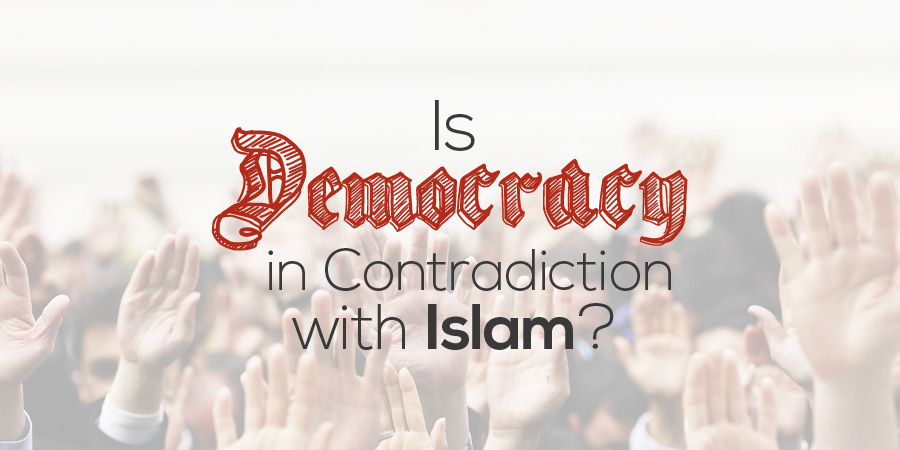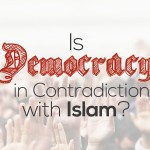Is Democracy in Contradiction with Islam? (1)

Meaning of democracy and its functional shifts
At the outset, I deem it necessary to explain the term “democracy”. The literal translation of “democracy” is “government of the people” or “populism”. It means that the people themselves are involved in administration, legislation, implementation of law and the political affairs of society, and no one else is involved in enacting and implementing law. This is the meaning of the word “democracy”.
Democracy throughout history has been expressed in many forms. In the beginning, as far as history indicates, approximately five centuries before the birth of the Holy Messiah (‘a), in Athens, the capital of Greece, this theory was advanced and put into action for some time in such a manner that all people, with the exception of slaves and minors below the age of 20 used to be directly involved in their sociopolitical affairs. Of course, it was not compulsory and the people were free to engage or not in such an important activity.
At that time, the people used to live in big cities and express their opinion about the issues and concerns of their city. Debates and discussions used to take place on the basis of which, decisions would be taken and put into practice. This form of government in which no specific person or group was in charge of the administration but the people themselves was called democracy or government of the people. This form of democracy was implemented for some time in Athens, the capital of Greece. Apart from the fact that philosophers and thinkers strongly campaigned against this method, describing it disparagingly and branding it as “the government of the ignorant”, it also faced numerous problems in practice. As such, it did not last long.
Such a method is impractical for big countries and populous cities because it is impossible for all the people to constantly get involved in social affairs. This method may temporarily be implemented in small cities, but in cities with a population of millions, all the people cannot decide the daily affairs of their city? This method was rejected until after the Renaissance another form of democracy was presented in which the people would elect their own representatives to take charge of the administrative affairs and the latter would rule on behalf of the former because direct involvement of the people was unfeasible. Since then, this theory earned many advocates and was gradually implemented in some countries until finally, during the 19th century this method of governance was accepted by almost all countries of Europe and other continents, and governments were established on this basis.
In our country also, this form of democracy is implemented. Practically, in all government organs and institutions the people get involved by participating in various elections and selecting of their own representatives, such as participation in presidential elections and elections of the Islamic Consultative Assembly, and selection of deputies by people to enact and approve bills, and also local council elections and the rest provided for in the Constitution. So, according to the second form of democracy which has distinct features in every political system, the people get involved in their sociopolitical affairs by means of their vote and selection of the legislators and implementers.
Meaning of democracy today
Nowadays, democracy has earned a more specific meaning and a regime in which religion has no role to play is regarded as “democrat”. Of course, this form of democracy does not negate religion but hinders it from getting involved in sociopolitical affairs. It does not allow the law enforcers, while implementing the law, to talk about religion, and no executive order or circular to be issued on the basis of religious decrees and values. In reality, this form of democracy is anchored in the secular system which totally separates religion from sociopolitical issues.
Of course, sometimes, the legislators and executives themselves may be religious individuals, go to church every week and make a vow to the church. They may possibly be members of religious groups and engage in specifically religious activities in a private national or local capacity beyond the official government jurisdiction. But, in government and administrative affairs, legislation or judiciary, in managing the country or implementing laws, nowhere must religion have any role or function.
It can be heard in a country like France—which is known as the bastion of freedom and democracy—that any girl wearing the Islamic modest dress [hijab] is proscribed from entering a school or university, because alienating religion is regarded as one of the features of democracy.
They say “Our system is secular and no symbol of religion should be seen in public institutions. Wearing a headscarf is a sign professing a religion and it must be disallowed in government institutions such as public schools. If a school is affiliated to the church or is private, there is no problem even if everybody wears a headscarf. However, in public schools and universities under the supervision of the government which give official diplomas, as well as in public offices and ministries, no symbol of religion must be seen.” This is a new interpretation of religion on the basis of which religious symbols and values are deemed in conflict with democracy.
According to the traditional interpretation and second form of democracy which means government of the people, if certain people are religious and want to practice their religious rites in offices, they should not be opposed because this practice is consistent with the desire of the people and based on the law enacted and implemented by the people themselves. Democracy demands that wherever they are, including schools, offices and ministries, the people must be free in their manner of dressing.
If the absolute majority of people are supporters of a religion and based on their religious inclination, want to choose a certain garment or want to perform their religious rituals, no one should hinder them. Once a law is passed by the will and desire of the people which makes performance of prayer in offices, ministries and universities mandatory, this is not in conflict with democracy because the people enact the law and they themselves implement it. According to the new interpretation of democracy, however, religious inclination of the people should not be manifested in sociopolitical matters.
Muhammad Taqi Misbah Yazdi Written by
Mansoor L. Limba Translated by


